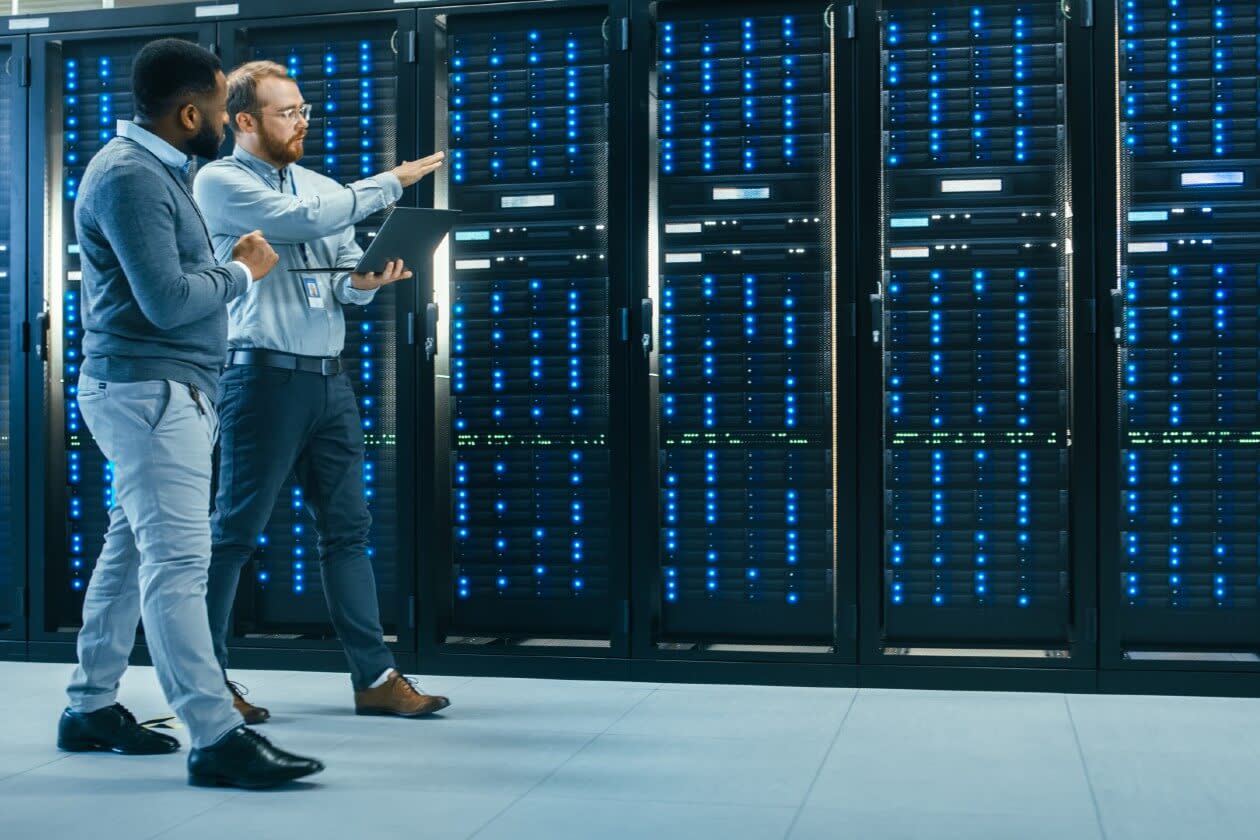The cloud refers to the delivery of computing services. Things like servers, storage, and databases, but more importantly the internet ('the cloud').
Instead of owning and maintaining physical infrastructure, users have access to resources on-demand from cloud service providers. So it’s more scalable flexible, cost-efficient, and resilient, making it a better choice for businesses of any size.
Before the cloud for example, a business wanting to use email would need a physical server, an operating system, and software like Microsoft Exchange. If anything went wrong, the company would have to fix it.
With cloud-based systems like Gmail or Outlook, all that’s handled for you. Now, with the huge computational resources necessary for business needs like artificial intelligence (AI), you can see why cloud computing is so important for the future.
In the next three years alone, the world’s expected to generate more data than the last 30. And by 2025, half of it‘s forecasted to be on the cloud.
That’s fuelling estimates that global spend on public cloud services could reach $679bn this year and as much as $2.5tn by 2031.
Servicing this jump in demand, and increases in AI workloads driving projected growth, requires beefed up infrastructures. Google, Amazon and Microsoft together spent $32bn in the three months to September 2023, up 10% from the quarter before. And this doesn’t show signs of slowing. But investing ahead of future revenues is risky business and we’ll have to wait to see if it pays off.
3 share ideas for cloud computing
With attractive recurring revenues, high margins and an impressive growth trajectory, it’s no surprise big technology companies are desperate to lead the cloud computing race. And more businesses are choosing to use multiple cloud providers, so there’s room for a few companies to win big in this space.
Chart showing cloud computing revenues
Here are three tech giants, accounting for two thirds of the cloud market.
Investing in cloud computing companies carries risk, including the potential for ups and downs because of the market’s high expectations. It’s important to carefully assess these risks and consider them before making any investment decisions in the sector.
This article isn’t personal advice. If you’re not sure an investment is right for you, seek advice. Investments and any income from them will rise and fall in value, so you could get back less than you invest. Past performance isn’t a guide to the future.
Investing in an individual company isn’t right for everyone because if that company fails, you could lose your whole investment. If you cannot afford this, investing in a single company might not be right for you. You should make sure you understand the companies you’re investing in and their specific risks. You should also make sure any shares you own are part of a diversified portfolio.
Remember, before you can trade US shares, you need to complete a W-8BEN form.
Amazon Web Services
Amazon is still the clear market leader, with just under a third of market share. Its cloud service generated $91bn in revenue in 2023, over 16% of overall group revenue, and is expected to keep growing in the years ahead. But this obviously isn’t guaranteed.
That might surprise anyone who only thinks of the group as an internet retailer. But the Amazon Web Services (AWS) division makes Amazon so much more than an online bookstore.
Benefiting from being the first, AWS is the most mature cloud platform, and provides users over 200 different services.
Originally catering to startups, AWS’ cloud offering provides both large and small businesses with a comprehensive range of solutions. The result? Big contracts with the likes of Netflix, Airbnb, and Formula 1, while still being an attractive partner for smaller companies.
Google Cloud Platform
Google Cloud Platform (GCP) is the smallest of the cloud providers, both in terms of services and revenues, with just 11% market share.
Google has been investing heavily to try and gain customers and wasn’t until April 2023 that the division reported profit for the first time. Now cloud computing accounts for 22% of Alphabet’s (Google’s parent company) total revenues. And in the last quarter, sales grew faster than AWS or Microsoft Azure.
Like AWS, GCP is focusing more on technology startups, although it does bundle cloud services when selling advertising and productivity products to bigger customers.
Even with its smaller size, GCP has a strong offering and competitive advantages. Customers benefit from Google’s high-performance network infrastructure and low latency connections. GCP is often preferred for sectors like finance and streaming where information transfer has be near instantaneous. That’s helped it attract big clients like Spotify and Paypal.
Microsoft Azure
As the second biggest cloud provider, with 24% of market share, Microsoft is closing the gap with AWS. This has helped generate almost $88bn in revenue in 2023, 41% of Microsoft’s total revenues.
Unlike AWS and GCP, Microsoft is more focused on large enterprise clients. Used by 95% of Fortune 500 companies, Azure has a proven history with some major names.
Providing services tailored to Microsoft-centric companies makes the switch to public and hybrid infrastructures a smoother process for clients. But, importantly, Azure isn’t limited to Window-based companies. It supports open-source technologies, so customers can use the tools they want.
Although exact pricing depends on a company’s usage and service requirements, Microsoft is thought of as the cheapest of the big three. With Amazon somewhere in the middle and Google slightly above.
Environmental, social and governance (ESG) risk in cloud computing
The cloud computing industry consumes a lot of energy and water, with servers and cooling systems running 24/7. Estimates suggest data centres, which can use 3-5 million gallons of water everyday, account for between 1-3% of the world’s electricity demand.
Providers will need to keep ploughing money into greening up their energy supply and developing innovative solutions like Microsoft’s underwater datacentre to sustainably meet demand.
Governance concerns about market influence is also a growing concern. Issues over market dominance and anti-competitive practices are front and centre of regulators agendas. Cloud hyperscalers like AWS, Azure and Google Cloud are already being investigated and could face intervention that makes the market a less attractive operating environment.
This article is original Hargreaves Lansdown content, published by Hargreaves Lansdown. It was correct as at the date of publication, and our views may have changed since then. Investments rise and fall in value so investors could make a loss.
This article is not advice or a recommendation to buy, sell or hold any investment. No view is given on the present or future value or price of any investment, and investors should form their own view on any proposed investment. This article has not been prepared in accordance with legal requirements designed to promote the independence of investment research and is considered a marketing communication. Non-independent research is not subject to FCA rules prohibiting dealing ahead of research, however HL has put controls in place (including dealing restrictions, physical and information barriers) to manage potential conflicts of interest presented by such dealing. Please see our full non-independent research disclosure for more information.


